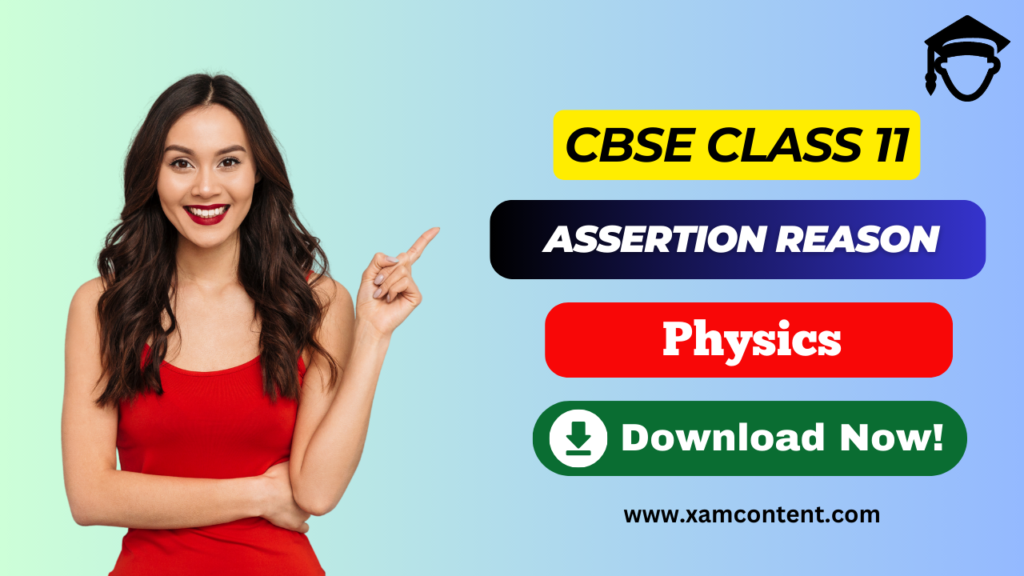Hello students, we are providing assertion reason questions for class 11. Assertion Reason questions are the new question format that is introduced in CBSE board. The resources for assertion reason questions are very less. So, to help students we have created chapterwise assertion reason questions for class 11 Physics. In this article, you will find assertion reason questions for CBSE Class 11 Physics Chapter 14 Waves. It is a part of Assertion Reason Questions for CBSE Class 11 Physics Series.
| Chapter | Waves |
| Type of Questions | Assertion Reason Questions |
| Nature of Questions | Competency Based Questions |
| Board | CBSE |
| Class | 11 |
| Subject | Physics |
| Useful for | Class 11 Studying Students |
| Answers provided | Yes |
| Difficulty level | Mentioned |
| Important Link | Class 11 Physics Chapterwise Assertion Reason |
Assertion Reason Questions on Waves
Assertion Reason Questions
Directions:
Each of the following questions consists of two statements: an Assertion (A) and a Reason (R). Answer them by selecting the correct option:
(a) Both Assertion (A) and Reason (R) are true, and Reason (R) is the correct explanation of Assertion (A).
(b) Both Assertion (A) and Reason (R) are true, but Reason (R) is not the correct explanation of Assertion (A).
(c) Assertion (A) is true, but Reason (R) is false.
(d) Assertion (A) is false, but Reason (R) is true.
Q1. Assertion (A): Transverse waves can propagate only in solids and on the surface of liquids.
Reason (R): Liquids and gases do not support shear stress.
Answer: Option (a) is correct.
Explanation: Transverse waves require a medium that resists shape change (shear stress). Solids have this property, but fluids do not. Hence both A and R are true and R explains A.
Difficulty Level: Moderate
Q2. Assertion (A): Sound waves in air are transverse waves.
Reason (R): Sound waves require a medium for propagation.
Answer: Option (c) is correct.
Explanation: Sound waves in air are longitudinal, not transverse. While sound requires a medium (R is true), the assertion is false.
Difficulty Level: Moderate
Q3. Assertion (A): In a stationary wave, nodes are the points of maximum amplitude.
Reason (R): Antinodes are the points of zero amplitude.
Answer: Option (d) is correct.
Explanation: It’s the opposite: nodes have zero amplitude, antinodes have maximum amplitude. So both A and R are false.
Difficulty Level: Tough
Q4. Assertion (A): The velocity of a wave on a string increases if tension is increased.
Reason (R): The velocity of a wave on a stretched string is $v=\sqrt{T / \mu}$.
Answer: Option (a) is correct.
Explanation: The wave speed depends on tension $T$ and mass per unit length $\mu$. As tension increases, so does speed. R correctly explains A.
Difficulty Level: Moderate
Q5. Assertion (A): The phenomenon of beats occurs when two waves of slightly different frequencies superpose.
Reason (R): The resultant amplitude varies periodically due to constructive and destructive interference.
Answer: Option (a) is correct.
Explanation: Beats are due to superposition of waves of nearby frequencies. The amplitude varies due to alternating constructive and destructive interference.
Difficulty Level: Moderate
Also check
- Waves Class 11 Assertion Reason Questions Physics Chapter 14
- Oscillations Class 11 Assertion Reason Questions Physics Chapter 13
- Kinetic Theory Class 11 Assertion Reason Questions Physics Chapter 12
- Thermodynamics Class 11 Assertion Reason Questions Physics Chapter 11
- Thermal Properties of Matter Class 11 Assertion Reason Questions Physics Chapter 10
- Mechanical Properties of Fluids Class 11 Assertion Reason Questions Physics Chapter 9
- Mechanical Properties of Solids Class 11 Assertion Reason Questions Physics Chapter 8
- Gravitation Class 11 Assertion Reason Questions Physics Chapter 7
- System of Particles and Rotational Motion Class 11 Assertion Reason Questions Physics Chapter 6
- Work, Energy, and Power Class 11 Assertion Reason Questions Physics Chapter 5
- Laws of Motion Class 11 Assertion Reason Questions Physics Chapter 4
- Motion in a Plane Class 11 Assertion Reason Questions Physics Chapter 3
- Motion in a Straight Line Class 11 Assertion Reason Questions Physics Chapter 3
- Units and Measurements Class 11 Assertion Reason Questions Physics Chapter 2
🚀 Boost Your Exam Prep: Get assertion reason questions for all subjects (Class 6-12) now!
👉 Explore more resources on CBSE Class 11
Topics from which assertion reason questions may be asked
- Types of waves: transverse and longitudinal
- Speed of wave motion
- Principle of superposition and standing waves
Sound waves travel fastest in solids and slowest in gases — a fact that influences engineering and communication systems.
Assertion reason questions from the above given topic may be asked.

Frequently Asked Questions (FAQs) on Waves Assertion Reason Questions Class 11
Q1: What is the importance of Waves in Class 11 Physics?
A1: It forms the basis for various real-life applications and is crucial for JEE/NEET level conceptual clarity.
Q2: Are assertion reason questions asked in CBSE exams?
A2: Yes, CBSE has introduced competency-based formats which include assertion reason questions to test conceptual understanding.
Q3: How to prepare assertion reason questions from Waves?
A3: Focus on key definitions, cause-effect relationships, and conceptual reasoning instead of just memorizing facts.
Q4: Can numerical topics appear in assertion reason format?
A4: Yes, concepts from numerical topics like laws, formulas, or effects of parameter change are often asked.
Q5: Where can I find more assertion reason questions on Waves?
A5: Visit xamcontent.com and physicsgurukul.com for chapterwise assertion reason question collections.


